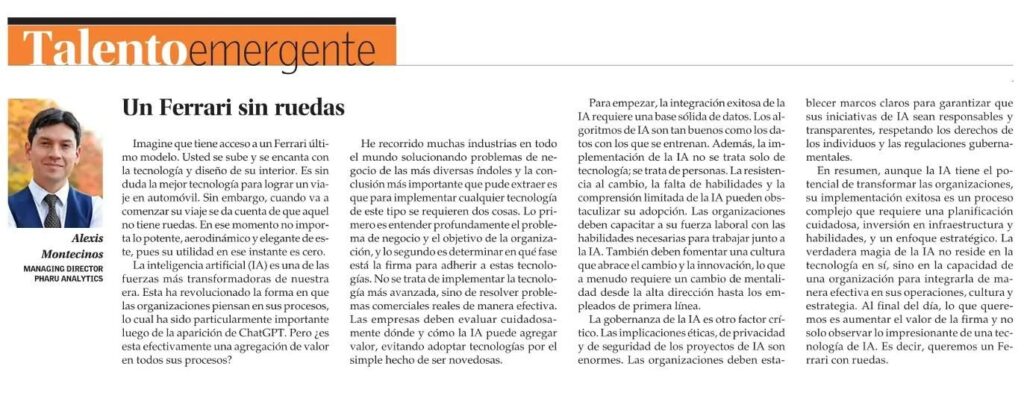Imagine you have access to a late-model Ferrari. You get in and are enchanted by the technology and design of its interior. It is undoubtedly the best technology for an automobile trip. However, when you are about to start your journey you realize that it has no wheels. At that moment it doesn’t matter how powerful, aerodynamic and elegant it is, because its usefulness at that moment is zero.
Artificial intelligence (AI) is one of the most transformative forces of our era. It has revolutionized the way organizations think about their processes, which has been particularly important since the emergence of ChatGPT. But is it really adding value to all your processes?
I have traveled through many industries around the world solving business problems of the most diverse nature and the most important conclusion I could draw is that in order to implement any technology of this type, two things are required. The first is to deeply understand the business problem and the organization’s objective, and the second is to determine at what stage the firm is at to adhere to these technologies. It is not about implementing the latest technology, but about solving real business problems effectively. Firms should carefully evaluate where and how AI can add value, avoiding adopting technologies simply because they are novel.
To begin with, successful AI integration requires a solid foundation of data. AI algorithms are only as good as the data they are trained on. Furthermore, AI implementation is not just about technology; it’s about people. Resistance to change, lack of skills and limited understanding of AI can hinder adoption. Organizations must empower their workforce with the skills needed to work alongside AI. They must also foster a culture that embraces change and innovation, which often requires a change in mindset from senior management to frontline employees.
AI governance is another critical factor. The ethical, privacy and security implications of AI projects are enormous. Organizations must establish clear frameworks to ensure that their AI initiatives are accountable and transparent, respecting the rights of individuals and government regulations.
In summary, while AI has the potential to transform organizations, its successful implementation is a complex process that requires careful planning, investment in infrastructure and skills, and a strategic approach. The real magic of AI lies not in the technology itself, but in an organization’s ability to effectively integrate it into its operations, culture and strategy. At the end of the day, what we want is to increase the value of the firm and not just look at the awesomeness of an AI technology. In other words, we want a Ferrari on wheels.

